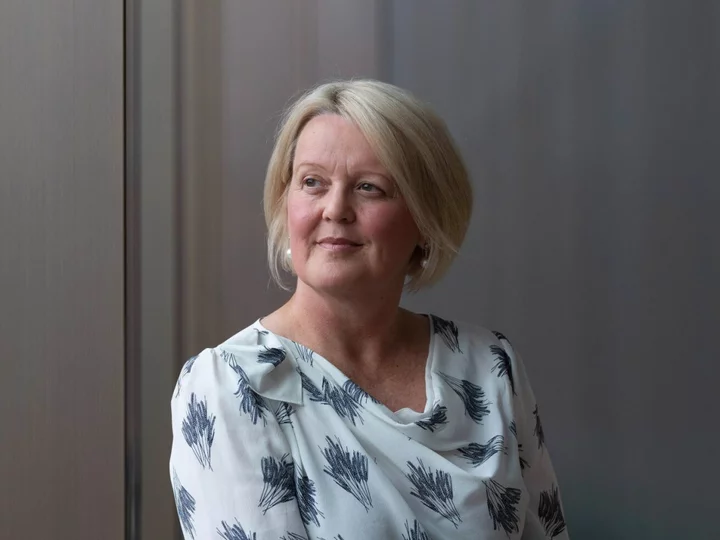NatWest Group Plc Chief Executive Officer Alison Rose is stepping down after a row over the way the British bank closed accounts held by politician-turned-pundit Nigel Farage, a move that came just hours after the board said she had their full confidence.
Rose, who has led the bank since November 2019, will leave by “mutual consent,” according to a statement in the middle of the night from the lender. Paul Thwaite, who runs the firm’s commercial and institutional business, will become interim CEO for 12 months. “A further process will take place in due course to appoint a permanent successor,” the statement said.
The announcement at around 1:30 a.m. in London came after the firm’s board — chaired by Howard Davies — hurriedly reconvened late on Tuesday to discuss Rose’s position with Prime Minister Rishi Sunak and Chancellor of the Exchequer Jeremy Hunt both indicating her position was untenable.
The U-turn followed an earlier statement noting that Rose had made an “error of judgment” after she admitted speaking to a BBC journalist about the decision to close Farage’s Coutts bank account. The board said it could cut her pay as a result but it was “clearly in the interest of all the bank’s shareholders and customers that she continues in post.”
Just hours later, with the political pressure mounting, Rose and NatWest were parting ways. Shares in the bank fell 3.3% at 8:41 a.m. in London.
Farage called for further changes in a phone interview on Wednesday, saying Peter Flavell, the head of NatWest’s Coutts unit, “has to go.”
City Minister Andrew Griffith welcomed the move on Wednesday.
“This would never have happened if NatWest had not taken it upon itself to withdraw a bank account due to someone’s lawful political views,” Griffith said in a tweet. “That was and is always unacceptable. I hope the whole financial sector learns from this.”
The UK remains NatWest’s biggest shareholder about 15 years after the government rescued what was then Royal Bank of Scotland in a £45.5 billion ($58.6 billion) bailout. It has been selling down its stake in recent years but still has about 39% of voting rights, according to a May 22 statement.
Her departure comes weeks after Farage unleashed a wave of criticism over a decison by Coutts, which caters to some of the UK’s wealthiest people including members of the royal family, to cut him off. Farage obtained documents from Coutts showing that staff discussed how his anti-immigration opinions did not align with the bank’s purpose.
Even before Tuesday, Rose had already written to Farage apologizing for the way the decision was handled, saying papers prepared for Coutts’s wealth committee on the former UK Independence Party leader “do not reflect the view of the bank” and it is “absolutely not our policy to exit a customer on the basis of legally held political and personal views.”
Farage’s angry comments about Coutts led to wider questions over the ability of banks to jettison customers without warning or explanation. Sunak has pledged to crack down on the practice.
“It is a sad moment,” said Davies, the long-serving chairman at NatWest. “She has dedicated all her working life so far to NatWest and will leave many colleagues who respect and admire her.”
Rose said she was proud of the progress the bank has made in supporting families and businesses around Britain.
It’s already a time of transition at NatWest, with Davies due to retire next year.
What Bloomberg Intelligence Says
Incoming interim CEO Paul Thwaite (who replaces Alison Rose after she unexpectedly stepped down) faces clear challenges: how to manage net interest margin amid public pressure to raise deposit costs, and a likely IFRS9-driven rise in provisions due to increasing chances of a recession in the UK as rates are set to rise well above 5% this year. Costs remain a focus given stubbornly high inflation.
Tomasz Noetzel, BI analyst
(Adds Farage response, NatWest shares)









